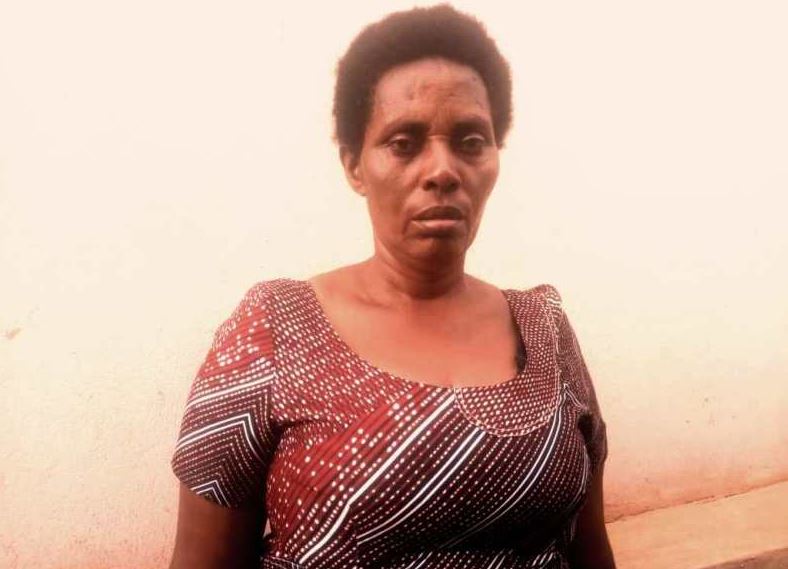As Rwandan Patriotic Front movement of refugees attacked Rwanda in 1990 in a bid to forcefully return home, the government immediately accused ethnic Tutsi inside the country of collaborating with the rebels.
The attack on Rwanda of which its regime was unwilling to a power sharing agreement with the rebels, meant tough times for the Tutsi in the country.
Government rolled out a well planned campaign to identify all ethnic Tutsi, they suffered all sorts of horrible discrimination, murder, and witch-hunt that climaxed in the 1994 genocide against Tutsi which claimed more than a million lives.
When the rebels overran Kagitumba border post, a hopeful Mukampfizi Joseline was 23 years old, a daughter of Kamanzi Augustine and Konzaki Epiphanie (both parents now deceased). They lived in present-day Ndatemwa cell, Kiziguro Sector of Gatsibo district.
In an exclusive interview with a Taarifa reporter days before the commemoration week, Mukampfizi said that her family had been accused of collaborating with the rebels and this led to their arrests and mistreatment.
“My parents, accused of collaborating with the rebels, were arrested and charged with treason,”said Mukampfizi, adding that her mother Konzaki Epiphanie was transferred to Ngarama detention facility(currently Gicumbi district).
Mukampfizi explained that as the war intensified between the rebels and government troops, life became very difficult for their family.
She said when one of her relatives(Kambanda) held a wedding, “a local official claimed that the wedding was a pretext to smuggle into the country Inkotanyi (rebels),” Mukampfizi said, adding that this caused more suffering for her bigger family members.
“Interahamwe militia stormed our home and looted everything including livestock and house items,” Mukampfizi remembers, adding that she and her siblings escaped into several hiding places from Kiziguro to Kiramuruzi.
She remembers that one of her two brothers escaped and joined the rebels while another remained at Kiziguro cathedral where hundreds of other Tutsi sought refuge.
However, Mukampfizi and her elder sister felt unsafe and decided to walk further to Rukara commune (Kayonza district today), “we believed it was safe there.”
“Me and my younger sister went to Karubamba village and hid in the church.There were many other people hiding there.”
At the beginning of 1994, Mukampfizi and her elder sister both separated from other siblings had lost hope because it was common knowledge that Tutsi were being killed, “I was just waiting for my turn any time of day,” she said.
When President Juvenal Habyarimana was killed in a plane crash, news reached Mukampfizi and her sister while they were hiding in Karubamba church.
Many days after the president was killed, Mukampfizi remembers that her parents were killed in Gakenke (presently Kiramuruzi sector)
“Some people came to the church and picked a few girls including my young sister and took them outside. They claimed to be taking them to a safer place but later killed them. Until today, I don’t know where my sister’s body was dumped,” says Mukampfizi.
According to Mukampfizi, her brother who was hiding at Kiziguro cathedral was dumped in a very deep ditch along with dozens of others, “however, he survived and was pulled out alive after the rebels liberated the area.
Mukampfizi told Taarifa that her brother who had joined the rebels, later died during battles against the defeated former government soldiers (FAR) and Interahamwe militia.
Mukampfizi, her elder sister and two brothers that had been the only surviving members of her family. “My elder sister and another brother later died of natural causes. I’m the only surviving member of the family,” she told Taarifa.
Three years after the genocide against Tutsi that claimed a million lives, the new government began mobilising Rwandans into organised settlements (imidugudu) across the country.
“In 1997, the government allocated hundreds of plots to families on our family land and promised to provide us with a 2-hectare compensation. We gladly accepted,” Mukampfizi told Taarifa in an exclusive interview.
While other residents received plots for; residential and cultivation, Mukampfizi 52, now a mother of five, says that she got nothing until her husband bought a small plot on the same land previously owned by her parents.
For the past 26 years, Mukampfizi has soldiered on in a prolonged wait for compensation of land that government promised her after it settled over three hundred families on over 12-hectares that belonged to her father.
During the interview, Mukampfizi reached for her box to pick out piles of documents including several letters addressed to sector, district and provincial authorities reminding them for the promised compensation.
“I have not received the compensation which I would be cultivating on and feeding my family. I have walked to several offices for many years but I have not been served,” Mukampfizi said, adding, “possibly one day they will honor the promise.”
Mukampfizi’s case is not an isolated one, she told Taarifa that there are other three colleagues with a similar problem including; Mwenzikazi Beatrice and another she only identifies as Kaitesi both living in the Kiziguro sector.








